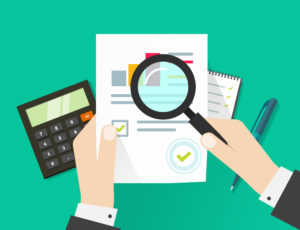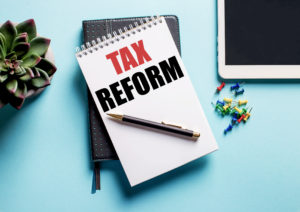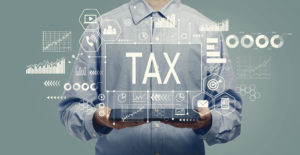Focus on Iowa

This month we travel to the Midwestern state of Iowa, the Hawkeye State. Sitting between the Missouri and Mississippi Rivers, the state is known for its rolling plains and cornfields.
Iowa has a humid continental climate throughout the state with extremes of both heat and cold. The average annual temperature at Des Moines is 50 degrees Fahrenheit. Winters are often harsh and snowfall is common. Iowa summers are known for heat and humidity, with daytime temperatures reaching 90 degrees.
Spring ushers in the beginning of severe weather season. Iowa averages about 50 days of thunderstorm activity per year. Iowa averages about 47 tornadoes per year. However, 2008 had the most tornadoes ever in a year: 105!
Returning To The Office? Important Information To Understand Your State Tax Liabilities
When the pandemic first hit, many businesses were forced to transition to a remote working model for safety reasons. And many of those remote employees decided to move away from their “home state” for a variety of reasons. Now, businesses are starting to transition back to the office, with 50% of leaders saying their company already requires or is planning to require a return to in-person full time this year, according to a study from Microsoft.
Whether you decide to bring your employees back to the office full time or just part time, what are the tax implications you should consider? Please note that this blog post won’t get into the state tax withholding, worker’s compensation or other payroll tax matters related to the employee directly. We focus here on how employees may create nexus (and filing responsibilities) for both state sales tax and income tax.
Taxation Issues Created By Remote Workers
Before we discuss the return to the office, it is important to understand the tax implications for business owners with remote employees in different states. We recommend checking out our past articles on the topic where we share detailed updates, but in short, remote workers who live in a different state than they work can create “nexus,” which is the amount of contact from a company needed in a given state in order to be obligated to collect sales tax in that state or to be subject to income tax or gross receipts type taxes. When we talk about employees or offices in a state, we’re talking about creating a physical presence nexus with a state. That’s important, because once nexus is deemed to be created, companies need to examine their filing requirements. For sales tax, it may require registration for sales tax, collection of the tax, remittance and the filing of returns. From an income tax perspective, companies need to review how to source income and then file income tax returns.
During the pandemic, some states decided they would not assert nexus on companies with short-term situations, while others waived nexus just for a certain period of time. Now that businesses are returning to the office, employees may be moving back to their business’s home state. How does this affect the nexus your business may have reached in a particular state? Do you just get to leave the state from a filing perspective once your employee comes back “home”?
Back To The Office: Tax Liabilities
One of the questions business owners may be wondering is how long until they can deregister and stop collecting sales tax in a state where their remote employee used to live?
As with most sales tax requirements, the answer varies by state and is subject to change.
Some states, such as New York, Tennessee, Vermont and Virginia, keep it simple — when the condition establishing the physical nexus in a state ends, a company’s sales tax compliance obligations also end.
Other states are not as easy to manage. About 35 states have trailing nexus policies, meaning they have an obligation to remain registered and report taxes in a state for a certain period of time, even after the established nexus ends. The amount of time that trailing nexus lasts varies by state. In some states it may just be for the rest of the calendar year, in some for another full year, and others don’t have a designated period of time. To learn more about specific trailing nexus requirements in your state, check out our blog article linked here.
Still Have Questions About Tax Liabilities Created By Your Employees?
As you can see, tax liability varies by state. Working with an experienced team of state tax consultants like Miles Consulting Group is a great way to get clarity on any tax liability requirements. If you have specific questions about your state sales tax obligations, please contact us today. We’re happy to clarify any multistate tax issues you’re trying to navigate.
Gray Areas In State Sales Tax: What You Need To Know Now
Tax legislation can be difficult to understand. It is not black and white; individuals sometimes interpret the same law in different ways. While most people can agree on the basics of sales tax laws , there are plenty of gray areas as the laws get more specific, especially if you are new to multistate sales tax compliance. In this blog article, we look at two areas of sales tax that often cause confusion: the taxation of digital products and services.
Digital Products & Sales Tax Confusion
SaaS and sales tax may at first seem like a straightforward area of taxation, but if you have kept up on our other blog articles linked here and here, you know it can get confusing quickly. In these cases, we recommend working with an expert multistate sales tax team like Miles Consulting Group.
For example, we worked with a client who developed a product on a platform they charge a subscription for, so it sounds like it would fit into a SaaS category. But given the way their customers interact with the product, it also could be categorized as an information service.
In this example, the client had multiple revenue streams, some classified as SaaS and others classified as information services. This created complications for the client because the same exact product may be taxed differently depending on how the state categorizes it. To help our clients with these issues, we look into what specifically the client provided to the customer and the tax law for each state they made sales in.
It is critical that a company correctly categorizes their products and services in each state they have liability in order to stay compliant and avoid a tax audit. To ensure compliance for all of our clients, we dig even deeper into statutes, ruling requests and regulations issued by a state's department of revenue relating to SaaS and information services.
Companies can even approach a state to ask for a ruling on why products or services are categorized a specific way. States often do come back with a ruling in these cases (though it may not be binding), which can help clear up some of these gray areas of SaaS sales tax.
Gray Areas In Service Sales Taxations
In the past, while it certainly varied by state, very few services were taxed overall. As our economy has become strongly service-based, many states have incorporated more sales service tax laws. Just like with SaaS and digital products however, the laws regarding the taxation of services are not uniform across all states, so it is another example of sales tax legislation with some gray areas. Currently, no two states tax services in exactly the same way.
A few areas that states vary on include: definitions of services, treatment of services and sourcing of services.
Since states do vary greatly in their service sales tax legislation, we recommend thinking about the services being taxed in six categories to clear up the confusion.
- Services related to the sale of tangible personal property (TPP). This typically means services that improve or repair property such as car repair or carpentry services.
- Services to real property including landscaping and janitorial work.
- Services performed for companies and businesses including credit reporting agencies and telephone answering services.
- Personal services, which includes personal grooming or other types of self-improvement. Tanning salons and animal grooming services would fit under this category.
- Professional services including physicians, accountants and other licensed professionals.
- Amusement/recreation services. This includes admission to amusement parks and other types of entertainment.
In our recent blog article linked here, we go into more detail about services and sales tax. Check it out to begin to understand the complex gray areas of service sales taxation.
Still Have Sales Tax Clarification Questions?
As you can see, there are many gray areas in sales tax legislation. Even if you are compliant, it can be difficult to make the right decisions related to sales tax for your company. Working with an experienced team of state tax consultants like Miles Consulting Group is a great way to get clarity on any gray area decisions you may need to make. If you have questions about your state sales tax obligations, please contact us today. We're happy to clarify any multistate tax issues you're trying to navigate.
NFT And Digital Product Sales Tax Clarification: Important Legislation To Keep In Mind
As the 2021/2022 fiscal year ended on June 30, many states implemented sales tax legislation reforms. In this blog article, we share a few standout updates you should know about.
Washington State Department of Revenue & NFT Sales Tax
NFTs, or non-fungible tokens, have been around since 2014, but started gaining momentum in 2021 and have only risen in popularity since. As you can imagine, this has created some sales tax confusion.
Washington state is one of the few states to tackle the taxiblity of NFTs, and on July 1, 2022, the Washington State Department of Revenue published an interim statement on how sales tax applies to NFTs. The statement is "intended to provide general information related to the taxability of certain transactions involving NFTs and does not intend to address any exemptions, exclusions, deductions, credits or other incentives that may apply." The interim statement functionally defines NFTs as a digital code.
Maryland Clarifies Sales Tax On Digital Products
The latest changes from Senate Bill 723 and House Bill 791 came into effect on July 1, 2022. The bills are a clarification of the state's tax on digital products and the third time that the digital product legislation has been fine-tuned.
The synopsis shared by the Maryland General Assembly states the purpose of the bill is to, "Alter the definition of digital product for purposes of the application of the sales and use tax to exclude certain products where the purchaser has a certain property interest and certain types of computer software."
As of July 1, SB 723 excludes the following from the list of taxable digital products:
- Any product that has electrical, digital, magnetic, wireless, optical, electromagnetic or similar capabilities where the purchaser holds a copyright or other intellectual property interest in the product if the purchaser uses the product only for commercial purposes, which includes marketing activities.
- Computer software or software-as-a-service purchased or licensed solely for commercial purposes in an enterprise computer system, which includes operating programs or application software for the exclusive use of the enterprise software system that is housed or maintained by the purchaser or on a cloud server, whether hosted by the purchaser, the software vendor or a third party.
Illinois Begins Year-Long Grocery Sales Tax Holiday
Starting at the beginning of July, Illinois suspended its 1% grocery sales tax for one year. This suspension doesn't include other items aside from food purchased at the store - medicine and hygiene products specifically will still be taxed at the 1% rate. Ready-made food, soft drinks, candy and alcohol will continue to be taxed at the state sales tax rate of 6.25% plus any local taxes if applicable.
Still Have Sales Tax Legislation Questions?
As you can see, sales tax legislation updates frequently and compliance is important for businesses to avoid an audit. Working with an experienced team of state tax consultants like Miles Consulting Group is a great way to stay up to date on multistate tax legislation. If you have questions about your state sales tax obligations, please contact us today. We're happy to clarify any multistate tax issues you're trying to navigate.
Focus on Maryland

This month we travel to the birthplace of religious freedom in America, the mid-Atlantic state of Maryland. Formed by George Calvert in the early 17th Century, the state was intended as a refuge for persecuted Catholics from England. George Calvert was the first Lord of Baltimore and the first English proprietor of the then-Maryland colonial grant. Maryland was the seventh state to ratify the U.S. Constitution and played a pivotal role in the founding of Washington D.C., which was established on land donated by the state.
Maryland is defined by its abundant waterways and coastlines on the Chesapeake Bay and Atlantic Ocean. Its largest city, Baltimore, has a history as a major seaport, and is also home to such tourist attractions as the National Aquarium and the Maryland Science Center.
Beer Brewing and Sales Tax in California- Part II

In our first beer blog in April we gave brewers an overview of how California’s sales and use tax applies to the beer brewing industry. In this beer blog we do a quick overview of some sales and use tax basics and then we share some more helpful tips so your tax reporting is as clean and crisp as your beer.
Significant Effects Of The Wayfair Decision Four Years Later
It is hard to believe that it has been just over four years since the landmark decision in the Supreme Court case of South Dakota v. Wayfair (2018) that changed the sales tax landscape across the country.
The decision made it so that states could require companies who met certain sales thresholds to collect and remit sales tax on sales, even if the company did not have a physical presence in the state. The ruling, however, did not automatically make economic nexus the standard in every state. Since it was a South Dakota case, the ruling technically applied just in that state until the other states individually changed their statutes. Since then, states across the country have enacted similar legislation based on the Wayfair decision. As of today, every state that has sales tax has enacted some sort of economic nexus law.
In the past four years, we have covered many sales tax issues related to Wayfair and economic nexus. As with most areas of multi-state tax legislation, even though every state now has economic nexus requirements, they are all complex and can vary, so questions often arise. Today, we will discuss Wayfair's significance four years later and what you can expect for the future of economic nexus challenges.
Wayfair's Significance In 2022
NetReflector/Potentiate surveyed hundreds of businesses to gauge the impact of Wayfair four years after the landmark decision. Key findings of the study include that awareness and impact of economic nexus have never been greater for businesses of all sizes and is particularly high for smaller businesses. Not only are more businesses than ever aware of economic nexus, they are also feeling the effects more than ever before, with 83% of all respondents recognizing that Wayfair has impacted how their company does business - the highest number since the survey was first conducted in 2019.
The survey also found that fewer businesses believe they've done all they can to be compliant. While informal, we can share that we are also still fielding calls daily from companies who are becoming more familiar with the economic nexus concept, but that still need help navigating all the nuances.
Marketplace Facilitation & Wayfair Laws
The survey also found that awareness and impact of marketplace facilitator laws have dropped among small businesses and increased in larger businesses.
Marketplace facilitator laws began to appear in 2017, but have dramatically increased since Wayfair, with every state with economic nexus legislation now also implementing marketplace facilitation legislation. This shifts the obligation to collect and remit sales tax to the marketplace instead of the individual seller. As we reported on in a recent blog, part of what makes the marketplace facilitator laws confusing is that legislators didn't write the laws for the myriad ways companies transact business in this space. Things like the taxation of services and rentals, to name a few, weren't necessarily considered in the passed legislation. So in some cases, taxpayers end up having to work with states to make sure they're complying with badly written laws. Just like economic nexus laws, even though every state with sales tax now has them, they vary depending on the state. For example, some states (such as Connecticut and Hawaii) require third-party sellers to register and file sales tax returns, even if they don't have a physical presence in the state. Oftentimes the trouble lies more in the documentation even than in the actual collection of tax. But, documentation is key and in an audit situation, companies want to make sure they are covered currently, as it is much harder to go back and try to pull documentation at a later date..
The Future Of Economic Nexus Legislation
If we have learned anything the past four years, it is that the tax landscape is unpredictable and constantly changing. Tax legislation will most likely continue to evolve as state governments look for new ways to generate revenue. Just like we have seen complications arise for marketplace facilitators as a result of the Wayfair decision four years ago, we expect to see additional sales tax obligations and economic nexus complications come up for digital products, services, NFTs and the metaverse, to name a few.
Still Have Economic Nexus Questions?
As you can see, even four years later, businesses can create economic nexus in a state without realizing it. Even if you are aware that you have nexus across multiple states, it can be difficult to know where to begin in your analysis and overall compliance. Working with an experienced team of state tax consultants like Miles Consulting Group is a great way to do this correctly. If you have questions about your economic nexus tax liability or have any other state sales tax compliance questions, please contact us today. We're happy to clarify any multi-state tax issues you're trying to navigate.
Focus on South Dakota

So, in honor of the 4 year anniversary of that ruling, we travel to the Upper Plains state of South Dakota. South Dakota is the 5th least populous state in the U.S. and is also the 5th least densely populated state in the country. The state is bisected by the Missouri River, dividing the state into two geographically and socially distinct halves, known to residents as "East River" and “West River.”
When you’ve been writing “State of the Month” blogs for several years, you end up hitting all of the states eventually, but South Dakota has certainly received its share of “publicity” from us over the last four years, as we’ve been referring to the US Supreme Court case of South Dakota v. Wayfair almost daily since that decision was handed down in June 2018. Seems fitting that, as state tax professionals, we have some affinity for the state that gave us economic nexus and created much confusion and consternation for companies all over the country!
Huge Sales Tax Questions Every Marketplace Facilitator Should Consider

A marketplace facilitator (or “MPF”) is a business or organization that contracts with third parties (“sellers”) to sell goods or services on its platform, facilitating the sales that arise (such as Amazon or Etsy). As the name seems to indicate, these companies facilitate sales of goods or services between a seller and a buyer – but generally the MPF does not take title to or even carry the inventory. Following the 2018 South Dakota vs. Wayfair U.S. Supreme Court decision eliminating the physical presence standard for sales tax nexus, most states have in the last 4 years started requiring the marketplace facilitators to collect and remit the sales tax on behalf of the third party sellers. This places a burden on MPFs to be the company which collects and remits and reports the sales tax to the various states in which they’ve established nexus.
However, not all marketplace facilitators are as large as Amazon or Etsy, and in their haste to pass laws to incorporate filing requirements on marketplace facilitators, many states didn’t give much consideration to businesses that might be outside the “norm” of simply facilitating the sale of tangible property on the marketplace.
Because of the complexity that arises for such marketplace facilitators, we often share articles detailing the most up-to-date issues. You can read some of our past articles here and here. Today, we focus on some unique circumstances that we’ve had with clients in their roles as marketplace facilitators.
Client Example 1: Marketplace Facilitators & Services
The taxation of services already varies state to state, making it complex for multi-state providers to keep up. As you can imagine, adding marketplace facilitation to the mix just further complicates the process. One client we’ve worked with is a company which matches providers of a service with the consumer who need that specific service performed (like home repair, yard work, etc). The marketplace facilitator provides a platform (and payment system) that helps match the need with the service. While this can be a useful system for consumers, it does come with sales tax consequences for the marketplace facilitator. First, if the marketplace facilitator charges any kind of separately stated platform fee, that can be subject to sales tax in many states. Also, many services are subject to sales tax and may require the marketplace facilitator to both understand which services are subject to tax in each of the states in which they create nexus and be able to collect it. Since taxability of services varies from state to state, this can get complicated quickly. A few common services subject to sales tax are: fabrication and installation, catering, and specific types of construction and landscaping.
Client Example 2: Sales Tax Complications For Marketplace Facilitators & Rentals
Another specific situation we’ve seen is a client who is a marketplace facilitator that connects people who own specialty equipment that they make available for rent to people looking to rent such equipment for a short time period. In a state like California where sales tax isn’t required to be collected on the rental stream as long as tax was paid up front on the purchase of the property, it may seem relatively straightforward. But what if the person putting equipment out on the marketplace platform for rent can’t readily prove that they paid sales tax on the original purchase? This is often the reality, especially if the item was originally purchased years ago. In this case, the marketplace facilitator may be required to collect tax on the rental stream. It then becomes more of a question of how to properly document the original payment of tax. Based on our detailed conversations with representatives at the California Department of Tax and Fee Administration (“CDTFA”), they certainly hadn’t considered all of the ramifications of such a fact pattern and the necessary documentation required when the state legislature passed the marketplace facilitation legislation. We’ve been working with our client and the state agencies to get to a good resolution. Also, that’s just California! Other states may treat the rental stream (and documentation thereof) differently.
Client Example 3: Liquor Sales As A Marketplace Facilitator
What happens if a regular online seller of unique gift items becomes, in effect, a marketplace facilitator because it begins to sell the occasional bottle of specialty liquor or wine, which, by their nature are subject to special rules? States generally require a seller of alcoholic beverages to be specially registered with the state’s alcoholic beverage commission. Thus, does the flow of goods through the website constitute a reseller relationship or make the company a marketplace facilitator because it can’t directly sell liquor to an end consumer without a liquor license? We recently had a client with this issue and found that the answer took us in a few different directions.
As you can see, marketplace facilitation and sales tax issues are not always as straightforward as you might think. Sometimes you may not even realize that you are a marketplace facilitator and need to be aware of this legislation.
Do You Need Help With Your Marketplace Facilitation Tax Compliance?
If you find yourself with questions regarding marketplace facilitation or sales tax, please give us a call! We recommend that people new to marketplace facilitation legislation connect with professionals like Miles Consulting Group to make sure they are compliant with the marketplace facilitation legislation in their state from the beginning. We would be happy to help you and clarify any tax issues you are trying to navigate. Contact us today.
Update to the California Partial Manufacturing Sales and Use Tax Exemption

Since 2014, qualified companies have been eligible for a partial exemption from sales tax for purchases of machinery and equipment used in qualified manufacturing and research and development activities. California was late to the table, as most states have long had exemptions for such purchases. The exemption has also been unique in that it has been a partial exemption, and allowable only on the first $200 million of qualified purchases.























